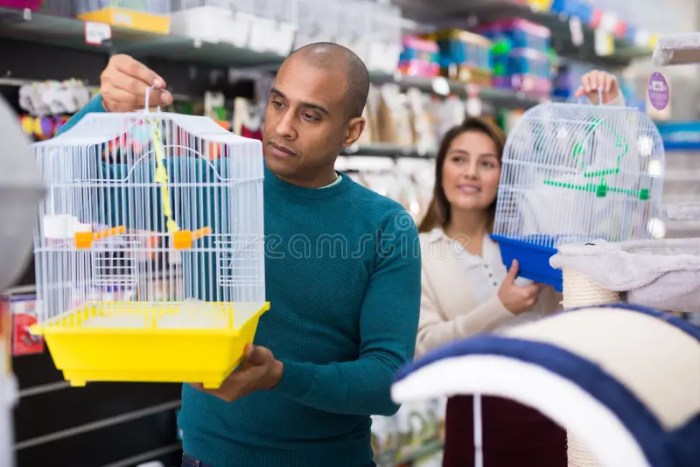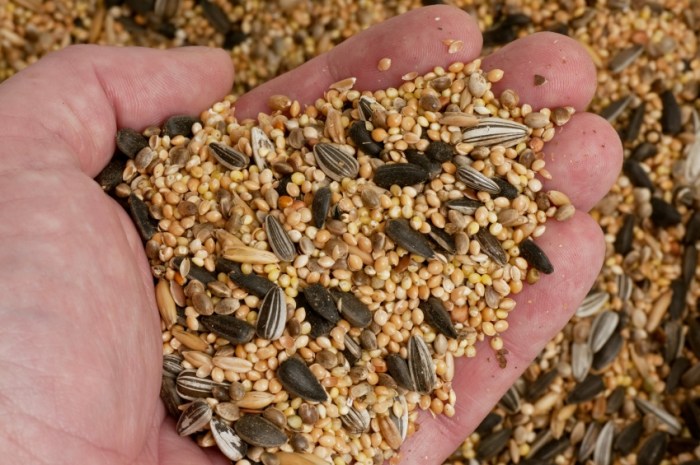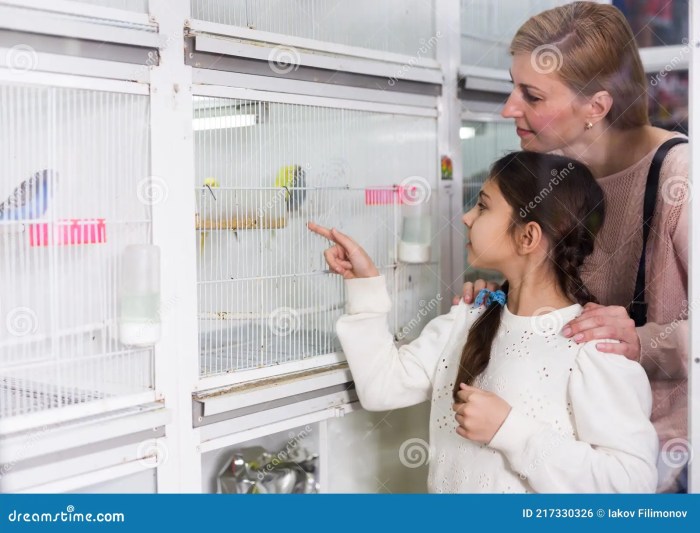Nellie is buying bird seed, and she’s not the only one. Millions of people around the world enjoy feeding birds, and for good reason. It’s a fun, easy, and rewarding way to connect with nature and help our feathered friends thrive.
But before you start buying bird seed, it’s important to do your research. Not all bird seed is created equal, and some types can actually be harmful to birds. In this guide, we’ll tell you everything you need to know about buying bird seed, from choosing the right type to storing it properly.
Bird Species

Bird seed is a popular food choice for many different species of birds. It provides a variety of nutrients that are essential for their health and well-being. The type of bird seed that is best for a particular species depends on its size, dietary needs, and habitat.
Some of the most common bird species that eat bird seed include:
- Cardinals
- Chickadees
- Finches
- Juncos
- Nuthatches
- Sparrows
- Titmice
Each of these species has specific nutritional needs, so it is important to choose a bird seed that is appropriate for their diet. For example, cardinals prefer seeds that are high in fat, while finches prefer seeds that are high in protein.
Nutritional Needs
Bird seed can provide a variety of nutrients that are essential for the health and well-being of birds. These nutrients include:
- Carbohydrates: Carbohydrates provide energy for birds.
- Protein: Protein is essential for building and repairing tissues.
- Fat: Fat provides energy and helps to keep birds warm.
- Vitamins: Vitamins are essential for a variety of bodily functions.
- Minerals: Minerals are essential for bone health and other bodily functions.
The specific nutritional needs of birds vary depending on their species, age, and activity level. However, bird seed can provide a good foundation for a healthy diet for most birds.
Nellie is buying bird seed for her feathered friends. While she’s at it, she decides to level up her knowledge on the renal system by checking out level up rn renal system . After a quick read, she’s back to her bird seed shopping, armed with new knowledge about how her feathered pals filter waste.
Bird Seed Composition

Bird seed blends are carefully formulated to provide birds with the essential nutrients they need for good health and vitality. The primary ingredients used in these blends include:
- Sunflower seeds:Rich in fat and protein, these seeds are a favorite among many bird species.
- Safflower seeds:High in fat and low in carbohydrates, these seeds are a good choice for birds that need to maintain a healthy weight.
- Nyjer seeds:Also known as thistle seeds, these small, black seeds are a favorite of finches and other small birds.
- Millet:A small, round seed that is high in carbohydrates and low in fat, millet is a good choice for birds that need a lot of energy.
- Cracked corn:A large, yellow seed that is high in carbohydrates, cracked corn is a good choice for birds that need a lot of energy.
Nutritional Value of Bird Seed Ingredients
The nutritional value of bird seed ingredients varies depending on the type of seed. However, all bird seed ingredients provide birds with essential nutrients, including:
- Protein:Essential for building and repairing tissues, protein is found in all bird seed ingredients.
- Fat:A source of energy, fat is found in all bird seed ingredients, but it is particularly high in sunflower seeds and safflower seeds.
- Carbohydrates:A source of energy, carbohydrates are found in all bird seed ingredients, but they are particularly high in millet and cracked corn.
- Vitamins:Bird seed ingredients are a good source of vitamins, including vitamin A, vitamin D, and vitamin E.
- Minerals:Bird seed ingredients are a good source of minerals, including calcium, phosphorus, and iron.
Types of Bird Seed
There are many different types of bird seed available, each with its own unique composition and nutritional content. Some of the most popular types of bird seed include:
- Black oil sunflower seed:A high-fat, high-protein seed that is a favorite among many bird species.
- Striped sunflower seed:A high-fat, high-protein seed that is a good choice for birds that need a lot of energy.
- Safflower seed:A high-fat, low-carbohydrate seed that is a good choice for birds that need to maintain a healthy weight.
- Nyjer seed:A small, black seed that is a favorite of finches and other small birds.
- Millet:A small, round seed that is high in carbohydrates and low in fat, millet is a good choice for birds that need a lot of energy.
- Cracked corn:A large, yellow seed that is high in carbohydrates, cracked corn is a good choice for birds that need a lot of energy.
Bird Seed Quality

The quality of bird seed can significantly impact the health and well-being of your feathered friends. Several factors determine the quality of bird seed, including:
Seed Composition
- Variety:High-quality bird seed should contain a mix of different seed types, providing a balanced diet for various bird species.
- Fillers:Avoid bird seed with fillers like millet or milo, which offer little nutritional value and can displace nutritious seeds.
Seed Freshness
- Expiration Date:Check the expiration date to ensure the seed is fresh. Old or rancid seeds can be unpalatable and may contain harmful bacteria.
- Appearance:Fresh seeds should be plump and free of cracks or holes. Avoid seed with a dull or moldy appearance.
Potential Risks of Low-Quality Bird Seed
- Nutritional Deficiencies:Low-quality bird seed can lack essential nutrients, leading to health problems like malnutrition or feather loss.
- Spoilage:Rancid or spoiled seed can attract pests and bacteria, posing a health risk to birds.
- Displaced Birds:Birds may avoid feeders with low-quality seed, leading to reduced bird activity in your area.
Bird Seed Storage

Storing bird seed properly is crucial to maintain its freshness, nutritional value, and prevent spoilage. Ideal storage conditions include:
- Temperature:Store bird seed in a cool, dry place, ideally between 40-60°F (4-16°C). Avoid extreme temperatures, as heat can damage the seed’s nutritional content, while freezing can cause condensation and mold growth.
- Humidity:Bird seed should be stored in a low-humidity environment, below 60%. High humidity can lead to seed clumping, mold growth, and reduced nutritional value.
- Light exposure:Keep bird seed away from direct sunlight, as UV rays can degrade the seed’s nutrients and attract pests.
Containers
Store bird seed in airtight containers to prevent moisture and pests from entering. Choose containers made of metal, glass, or heavy-duty plastic that are rodent-proof.
Duration
Properly stored bird seed can last for several months. However, it’s recommended to rotate seed stock regularly to ensure freshness. Discard any seed that shows signs of spoilage, such as mold, discoloration, or an off odor.
Consequences of Improper Storage, Nellie is buying bird seed
Improper storage can lead to:
- Loss of nutritional value
- Seed clumping and reduced palatability
- Mold growth and potential health risks to birds
- Pest infestations
Bird Seed Safety

Bird seed can pose potential hazards to birds if not handled and stored properly. Mold, bacteria, and pesticides are common contaminants that can cause illness or even death in birds.
Minimizing Hazards
To minimize these hazards, it is crucial to:
Purchase bird seed from reputable sources
Choose seed suppliers that follow strict quality control measures to ensure the absence of harmful contaminants.
Inspect bird seed regularly
Check for signs of mold, discoloration, or unusual odors. Discard any seed that appears compromised.
Store bird seed properly
Keep bird seed in airtight containers in a cool, dry place. Avoid storing seed in humid or damp areas that promote mold growth.
Clean bird feeders regularly
Remove old seed and wash feeders thoroughly to prevent the accumulation of bacteria and mold.By following these guidelines, you can help ensure the safety of birds when feeding them bird seed.
Bird Seed Alternatives

While bird seed can be a convenient and nutritious source of food for birds, it’s not the only option available. There are many other food sources that can supplement or even replace bird seed in a bird’s diet. These alternatives offer a variety of nutritional benefits and can help to keep birds healthy and happy.
When choosing bird seed alternatives, it’s important to consider the specific needs of the birds you’re feeding. Different birds have different dietary requirements, so it’s important to do your research to find out what foods are best for your particular birds.
Fruits and Vegetables
Fruits and vegetables are a great source of vitamins, minerals, and antioxidants for birds. They can be offered fresh, frozen, or canned. Some good choices for birds include:
- Apples
- Bananas
- Berries
- Grapes
- Mangoes
- Oranges
- Pears
- Tomatoes
- Sweet potatoes
Avoid feeding birds avocados, as they are toxic to them.
Essential FAQs: Nellie Is Buying Bird Seed
What is the best type of bird seed to buy?
The best type of bird seed to buy depends on the type of birds you want to attract. Black-oil sunflower seeds are a good all-around choice, but you can also find seed mixes that are specifically designed for different types of birds, such as songbirds, cardinals, and woodpeckers.
How much bird seed should I put out?
The amount of bird seed you put out will depend on the number of birds you want to attract. A good rule of thumb is to put out about 1/4 cup of seed per day for every 10 birds you want to attract.
How often should I clean my bird feeder?
You should clean your bird feeder at least once a week to prevent the spread of bacteria and disease. To clean your bird feeder, simply remove the old seed and wash it with hot, soapy water. Rinse the feeder thoroughly and allow it to dry completely before refilling it with new seed.